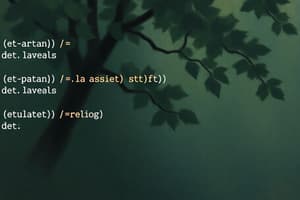Podcast
Questions and Answers
Explain what an operator is in C programming language.
Explain what an operator is in C programming language.
An operator in C is a symbol that instructs the computer to perform specific mathematical or logical manipulations on data and variables. C supports a variety of operators that are used in expressions to manipulate data and produce a single value.
What is an expression in C programming language?
What is an expression in C programming language?
An expression in C is a sequence of operands and operators that reduces to a single value. It can consist of mathematical or logical manipulations using operators and operands.
Give examples of arithmetic operators in C and explain their usage.
Give examples of arithmetic operators in C and explain their usage.
Examples of arithmetic operators in C are: + (addition), - (subtraction), * (multiplication), / (division), % (modulo division). These operators are used to perform mathematical operations on operands.
What is the modulo division operator in C and what type of data can it be used on?
What is the modulo division operator in C and what type of data can it be used on?
List the categories of operators in C programming language.
List the categories of operators in C programming language.
Flashcards are hidden until you start studying
Study Notes
Operators in C
- An operator is a symbol that instructs the computer to execute specific mathematical or logical operations.
- C programming language boasts a diverse array of operators that manipulate data and variables.
- Operators form an integral part of expressions, which are sequences of operands and operators that evaluate to a single value.
Categories of C Operators
-
Arithmetic Operators: Used for mathematical calculations.
- Addition:
+ - Subtraction:
- - Multiplication:
* - Division:
/ - Modulo (Remainder):
% - Example expressions include:
a - b,a + b,a * b,a / b,a % b
- Addition:
-
Relational Operators: Used to compare values (not detailed in the text provided).
-
Logical Operators: Used for logical operations (not detailed in the text provided).
-
Assignment Operators: Used to assign values to variables (not detailed in the text provided).
-
Increment and Decrement Operators: Used to increase or decrease a variable's value by one (not detailed in the text provided).
-
Conditional Operators: Ternary operator (not detailed in the text provided).
-
Bitwise Operators: Perform operations on binary representations of integers (not detailed in the text provided).
-
Special Operators: Include size of operator and pointer operators (not detailed in the text provided).
Integer Arithmetic
- When performing integer arithmetic, both operands must be integers; using the modulo division operator
%is not valid for floating-point numbers.
Studying That Suits You
Use AI to generate personalized quizzes and flashcards to suit your learning preferences.




